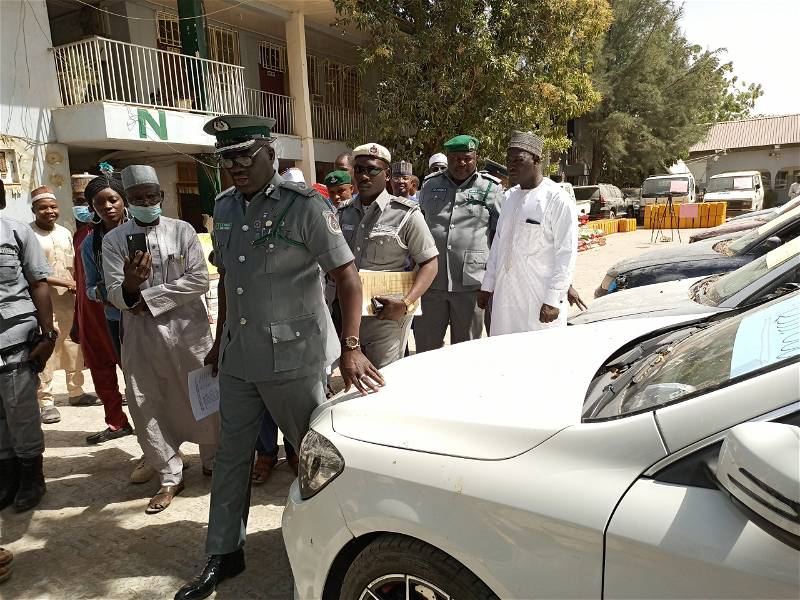Jibiya: Caught Between Sanctions, Bandits And The Nigeria Customs Service

Daily Trust
Three hundred thousand human beings are gradually starving, the sick are unable to go to hospital as poverty is being entrenched in a previously thriving…
Three hundred thousand human beings are gradually starving, the sick are unable to go to hospital as poverty is being entrenched in a previously thriving business district in Katsina State. Before bandits began systematic attacks designed to cut off Jibiya town from Katsina, the capital city, the town thrived. It is the gateway to Niger Republic’s most important commercial city, Maradi, and other Sahelian countries. It marked an important stopover for exports from Kano’s Dawanau grains market and places as distant as southern Algeria.
Since 2000 when bandit attacks intensified, however, businessmen and the structures that depend on them have abandoned the 47-kilometre road from Katsina to Jibiya. At the last count, 42 checkpoints by various security agencies that include the army, police, customs and immigration manned the road from 7am to 6pm. Thereafter, bandits took control, robbing, killing and kidnapping anybody who dared, or was forced, to follow the road.
In the last 12 months, the bandits changed goals. Jibiya market, once the biggest of its type in Katsina State, used to attract multinational marketers and customers four days a week – from Thursday to Monday. The place bristled with business. Bandits, however, targeted those days, attacking cars, buses and lorries going into, or out of Jibiya, from Zamfara and the rest of Katsina States, in broad daylight.
Couldn’t the security agencies help the people? After all, they ensured that an “unauthorised” litre of petrol did not pass through the road since the federal government banned the sale of petroleum products in border areas. They have weapons too, just like the bandits. Couldn’t they help? After all, they “charge” specific amounts for every item, including a bag of corn, that follows the road. Not even a box of matches is spared. Indigenes of the Local Government lament that the focus of the security agencies is different. Every agency is an exclusively anti-smuggling force.
But there are exceptions. There are many individual officers of the Police, Army, DSS and Civil Defence who continue to display exceptional bravery and care for the people. Some even lost their lives in the process. Interviews with all strata of society continue to praise, pray for and glorify these individuals, whose names and identities the people know.
Commerce throughout Jibiya Local Government depends on three arterial roads – the Zamfara highway, the state road linking Jibiya with Batsari and the Kano to Maradi international highway. Travelling on the first two is suicidal, leaving the international highway as the remaining source of food supply and commerce. Now bandits block even the international highway in broad daylight, with its 42 checkpoints.
The entire local government is being mercilessly strangulated. Unable to go to their farms, citizens have to rely on buying from other places, if there is free passage on the road. But there isn’t. The little foodstuff that sneaks its way there is prohibitively expensive due to the highway “tolls” that marketers have to pay. Sanctions on Niger Republic and the people-to-people damage that it brought about have constricted commerce.
Part of the strategy of the Katsina State Government was the employment, training and equipping of 300 persons to assist in community policing against banditry. While awaiting the outcome of the noble idea, fears continue to be expressed on whether the majority-Hausa corps will not lead to an all-out tribal war or extermination if the Fulani. Others fear the long-term after effect of a trained and armed vigilante, especially in a society that cannot guarantee employment.
For the people of Jibiya LGA, however, the future is how to survive today. The sordid details are grim. Unless urgent help comes from somewhere, men, women, children in most parts of the area, with all its prospects, are beginning to abandon everything and end up internally displaced, roving and begging for alms, while young women end up as prostitutes. Many villages in Gangara and Bugaje wards are merely empty structures. Bandits remove the roofs of already empty homes and mosques and use schools as their camps.
Abdu Jibiya wrote from Abuja.

